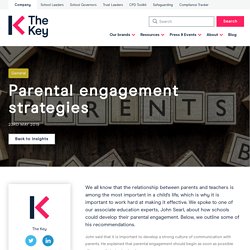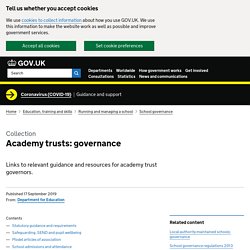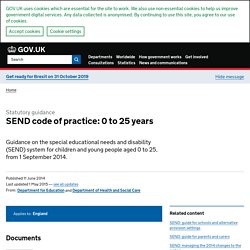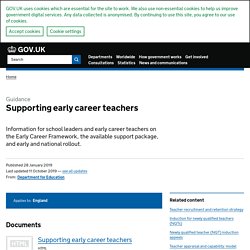Working in Partnership
> NPQ
Parental engagement strategies. The Key We all know that the relationship between parents and teachers is among the most important in a child's life, which is why it is important to work hard at making it effective.

We spoke to one of our associate education experts, John Searl, about how schools could develop their parental engagement. Below, we outline some of his recommendations. John said that it is important to develop a strong culture of communication with parents. He explained that parental engagement should begin as soon as possible after a pupil starts at school.
Building personal relationships with parents Parental engagement should begin as soon as possible after a pupil starts at school John said it is particularly important for members of the senior leadership team (SLT) to make sure that they are visible and accessible around the school, to help them communicate with parents on a one-to-one level. Engaging with ‘hard-to-reach’ parents Case study: involving parents in school life. Academy trusts: governance. Statutory guidance and requirements The links and documents below explain the policies that academy trusts must follow by law and their funding agreement.

Not all statutory guidance is included in this section as some links are listed under their relevant topic below. A list of statutory guidance for schools is available in the Schools: statutory guidance collection. Safeguarding, SEND and pupil wellbeing Model articles of association School admissions and attendance Governance duties, skills, behaviours and knowledge Financial governance Guidance, advice and tools to help schools manage and improve their resource management.
Academies year plan Information for new academies and trusts, including changes. Governance handbook 2019. SEND Code of Practice: a summary. SEND code of practice: 0 to 25 years. This statutory code contains: details of legal requirements that you must follow without exception statutory guidance that you must follow by law unless there’s a good reason not to It explains the duties of local authorities, health bodies, schools and colleges to provide for those with special educational needs under part 3 of the Children and Families Act 2014.

The code, which applies to England, is for: headteachers and principals governing bodies school and college staff special educational needs (SEN) coordinators early education providers local authorities health and social services staff This document replaces the ‘Special educational needs (SEN): code of practice’ 2001. Other SEND guides are also available.
EEF welcomes Dept for Education’s new Early Career Framework. The EEF has today welcomed the launch of the Department for Education's Early Career Framework, part of its new Teacher Recruitment and Retention Strategy.

This will 'underpin a fully-funded, 2-year package of structured support for all early career teachers linked to the best available research evidence – alongside funded time off-timetable in the second year of teaching and additional support for mentors'. The EEF will be funding pilots from September 2019 to consider how to effectively train mentors to support early career teachers, which will be followed by further trialling to support national roll-out. Sir Kevan Collins, Chief Executive of the EEF, commented:
The Early Career Framework: A Thumbs-Up. Phil Naylor Phil is in his second Assistant Headship in Blackpool.

He has taught Science for 17 years, is a Science SLE, an ITT and NQT professional mentor, as well as a Primary School Governor. Phil is also Assistant Director of the Blackpool Research School, heads up... Read more about Phil Naylor Why should we welcome the Early Career Framework (ECF)? I write this blog from the viewpoint of an experienced professional mentor working across all iterations of Initial Teacher Training through to Newly Qualified Teachers and beyond.
The advances in evidence-based education and the use of research by teachers (pioneered through Research Schools) with high-quality CPD has further professionalised our teachers. Is mentoring a bolt-on? There has also long been the issue of mentoring and support of trainees and NQTs. A warm welcome … I warmly welcome the new guidance which the DfE rather inclusively has designed to ‘build on and complement ITT’. Standard 1 – Set high expectations. Early Career Framework: everything you need to know. The year is 2022, it’s Friday, period five, and Mr Findlay is standing at the front of his classroom. He closes his eyes and takes a deep breath. The pupils know that Mr Findlay is just into his second year as a qualified teacher. Accordingly, two of the “livelier” pupils, Patrick and Stephen, begin to giggle at one another at the back of the classroom, conscious of an easy target. They have conspicuously chosen not to write the date as instructed and, instead, have turned to each other to engage in conversation.
It is an age-old test of mettle; venturing over the established boundaries to scout out the response from the teacher stood in front of them. What the pupils don’t know is that the new early career induction period means that Mr Findlay has enjoyed coaching in his school based on a rigorous and structured framework, informed by the best available research evidence. So Mr Findlay has the knowledge and the strategies to deal with this common scenario. No longer alone New approach 1.
Supporting early career teachers. These documents outline the planned support for early career teachers.







